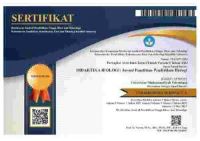KORELASI SELF REGULATED LEARNING DAN SELF EFFICACY DENGAN METAKOGNITIF PESERTA DIDIK PADA MATA PELAJARAN BIOLOGI
Abstract
Metakognitif merupakan salah satu hal yang penting dalam pendidikan di Abad 21. Setiap peserta didik dapat memiliki kemampuan metakognitif berbeda-beda yang dipengaruhi oleh banyak faktor, diantaranya adalah self regulated learning dan self efficacy. Tujuan penelitian ini adalah untuk mengetahui korelasi self regulated learning dan self efficacy dengan metakognitif peserta didik pada mata pelajaran biologi. Metode penelitian yang digunakan adalah korelasional dengan populasi seluruh peserta didik kelas XI MIPA. Sampel dipilih menggunakan teknik purposive sampling yakni kelas XI MIPA 3 berjumlah 38 orang. Instrumen yang digunakan adalah angket Metacognitive Awareness Inventory (MAI) untuk mengukur metakognitif peserta didik, angket self regulated learning untuk mengukur self regulated learning, dan angket self efficacy untuk mengukur self efficacy. Analisis data menggunakan uji korelasi berganda. Hasil penelitian menunjukkan ada korelasi yang signifikan antara self regulated learning dan self efficacy dengan metakognitif peserta didik dengan nilai koefisien korelasi sebesar 0,807 yang artinya hubungan ketiga variabel tersebut termasuk dalam korelasi sangat kuat. Selain itu variabel self regulated learning dan self efficacy memberikan kontribusi sebesar 65,2% terhadap metakognitif peserta didik.
Metacognitive is one of the important things in education in the 21st Century. Each student can have different metacognitive abilities that influenced by many factors, including self-regulated learning and self-efficacy. The purpose of this study was to determine the correlation of self-regulated learning and self-efficacy with students' metacognition in biology subjects. This research was used a correlational method. The population in this research are all students of class XI MIPA. The sample used was selected using a purposive sampling technique, namely class XI MIPA 3 which amounted to 38 people. The instruments used were the Metacognitive Awareness Inventory (MAI) questionnaire to measure the metacognitive of students, the self-regulated learning questionnaire to measure self-regulated and the self-efficacy questionnaire to measure self-efficacy. Data analysis used multiple correlation test. The results showed that there was a significant correlation between self-regulated learning and self-efficacy with students’ metacognitive. Obtained correlation coefficient of 0.807, which means that the relationship between the three variables are very strong correlation. In addition, the coefficient of determination was 0.652, which means that the self-regulated learning and self-efficacy variables contributed 65.2% to the metacognitive of students.
Keywords
Full Text:
PDFReferences
Alkadrie, R. P., Mirza, A., & Hamdani. (2015). Faktor-faktor yang Mempengaruhi Level Metakognisi dalam Pemecahan Masalah Pertidaksamaan Kuadrat di SMA. Jurnal Pendidikan dan Pembelajaran Khatulistiwa, 4(12), 1–13.
Aurah, C. M. (2013). The Effects of Self-efficacy Beliefs and Metacognition on Academic Performance: A Mixed Method Study. American Journal of Educational Research, 1(8), 334–343. https://doi.org/10.12691/education-1-8-11
Bandura, A. (1997). Self Efficacy: The Exercise of Control. New York: W.H. Froeman and Company.
Çetin, B. (2017). Metacognition and Self-regulated Learning in Predicting University Students Academic Achievement in Turkey. Journal of Education and Training Studies, 5(4), 132–138. https://doi.org/10.11114/jets.v5i4.2233
Fitriani, I. N., Hindriana, A. F., & Satianugraha, H. (2016). Hubungan Self Regulated Learning dengan Metakognitif Siswa Kelas X pada Pembelajaran Biologi di SMA Negeri 1 Ciawigebang. Quagga: Jurnal Pendidikan dan Biologi, 8(10), 12-17. Diakses dari https://journal.uniku.ac.id/index.php/quagga/article/view/820
Hardianto, Daud, F., & Bahri, A. (2020). Meningkatkan Keterampilan Metakognitif Siswa SMA Berkemampuan Akademik Berbeda pada Pembelajaran Biologi Melalui Strategi PBLRQA Dipadu Jurnal Belajar. Artikel Mahasiswa Universitas Negeri Makasar. Diakses dari http://eprints.unm.ac.id/16513/1/Artikel_Hardianto_1614042004.pdf
Hayati, N. (2011). Metakognitif: Bagaimana Belajar untuk Meningkatkan Prestasi. Al-Hikmah: Jurnal Agama dan Ilmu Pengetahuan, 8(1), 25–32. Diakses dari https://journal.uir.ac.id/index.php/alhikmah/article/view/1534
Hernawan, E. (2020). Pengantar Statistika untuk Penelitian Pendidikan (Edisi Revisi). Lembanga Penelitian dan Pengabdian Masyarakat (LPPM) Universitas Siliwangi.
Hidayati, N., Mustofa, R. F., & Putra, R. R. (2021). Hubungan antara Self-efficacy dengan Metakognitif Peserta Didik pada Mata Pelajaran Biologi Kelas XI MIPA. Jurnal Pendidikan Biologi, 12(3), 174–181.
Iskandar, S. M. (2014). Pendekatan Keterampilan Metakognitif dalam Pembelajaran Sains di Kelas. Erudio Journal of Educational Innovation, 2(2), 13–20. Diakses dari https://erudio.ub.ac.id/index.php/erudio/article/view/151
Murniningsih, R., Zuhriyah, E., & Fitrilia, M. (2016). Faktor Psikologis Karyawan & Pengaruhnya terhadap Kinerja UMKM. The 4th University Research Coloquium (URECOL), 227–236. Diakses dari https://publikasiilmiah.ums.ac.id/handle/11617/7867
Mustofa, R. F., Corebima, A. D., Suarsini, E., & Saptasari, M. (2019). The Correlation between Generic Skills and Metacognitive Skills of Biology Education Students in Tasikmalaya Indonesia Through Problem-Based Learning Model. The Journal of Social Sciences Research, 5(4), 951-956. https://doi.org/10.32861/jssr.54.951.956
Mustopa, N. M., Mustofa, R. F., & Diella, D. (2020). The Relationship between Self-Regulated Learning and Learning Motivation with Metacognitive Skills in Biology Subject. JPBI (Jurnal Pendidikan Biologi Indonesia), 6(3), 355–360.
Nabiila, A. (2019). Korelasi Antara Kecerdasan Emosional dan Motivasi Belajar Biologi dengan Self Regulated Learning di Kelas X SMA Negeri 1 Kota Tasikmalaya. Skripsi, tidak diterbitkan. Universitas Siliwangi.
Novia, H., Kaniawati, I., & Rusdiana, D. (2016). Identifikasi Pengetahuan Metakognisi Calon Guru Fisika. Prosiding Seminar Nasional Fisika (E-Journal) SNF2016, V, 13–18.
Nugraheni, I. L. (2018). Hubungan Self Efficacy terhadap Motivasi Berprestasi Pada Mahasiswa Pendidikan Geografi Fakultas Keguruan dan Ilmu Pendidikan Universitas Lampung. Lectura: Jurnal Pendidikan, 9(1), 52–64.
Oguz, A., & Ataseven, N. (2016). The Relationship Between Metacognitive Skills and Motivation of University Students. Educational Process: International Journal, 5(1), 54–64. https://doi.org/10.12973/edupij.2016.51.4
Ozan, C., Gundogdu, K., Bay, E., & Celkan, H. Y. (2012). A Study on the University Students’ Self-Regulated Learning Strategies Skills and Self-Efficacy Perceptions in Terms of Different Variables. Procedia - Social and Behavioral Sciences, 46, 1806–1811. https://doi.org/10.1016/j.sbspro.2012.05.383
Pintrich, P. R., & De Groot, E. V. (1990). Motivational and Self-Regulated Learning Components of Classroom Academic Performance. Journal of Educational Psychology, 82(1), 33–40. https://doi.org/10.1037/0022-0663.82.1.33
Rahman, S., & Phillips, J. A. (2006). Hubungan antara Kesedaran Metakognisi, Motivasi dan Pencapaian Akademik Pelajar Universiti. Jurnal Pendidikan Malaysia, 31, 21–39. Diakses dari http://journalarticle.ukm.my/161/1/1.pdf
Schraw, G., & Dennison, R. S. (1994). Assessing Metacognitive Awareness. Contemporary Educational Psychology, 19(4), 460–475. https://doi.org/10.1006/ceps.1994.1033
Sudarisman, S. (2015). Memahami Hakikat dan Karakteristik Pembelajaran Biologi dalam Upaya Menjawab Tantangan Abad 21 serta Optimalisasi Implementasi Kurikulum 2013. Jurnal Florea, 2(1), 29–35.
Suyanti, Sunyono, & Efkar, T. (2016). Hubungan Efikasi Diri dan Kemampuan Metakognisi dengan Penguasaan Konsep Kimia Menggunakan Model Simayang. Jurnal Pendidikan dan Pembelajaran Kimia, 5(3), 52–64.
Winaryati, E. (2018). Penilaian Kompetensi Siswa Abad 21. Seminar Nasional Edusainstek FMIPA Universitas Muhammadiyah Semarang, 6–19. Diakses dari https://jurnal.unimus.ac.id/index.php/psn12012010/article/view/4070
Yuliyani, R. (2017). Peran Efikasi Diri (Self Efficacy) dan Kemampuan Berpikir Positif terhadap Kemampuan Pemecahan Masalah Matematika. Jurnal Formatif, 7(2), 130–143.
DOI: https://doi.org/10.32502/dikbio.v7i1.5098
Copyright (c) 2023 Dilla Deliya Novita, Romy Faisal Mustofa, Dea Diella
Didaktika Biologi: Jurnal Penelitian Pendidikan Biologi is indexed by:

Didaktika Biologi: Jurnal Penelitian Pendidikan Biologi is licensed under a Creative Commons Attribution-ShareAlike 4.0 International License.







